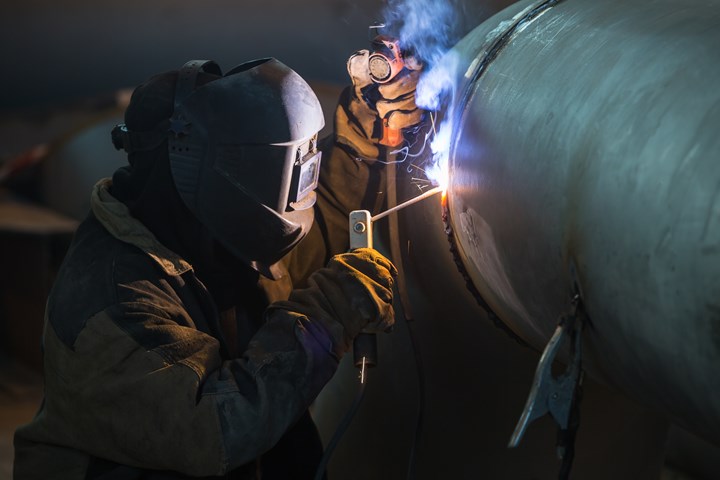Achieving Welding Excellence: Unveiling the Keys of WPS Execution and Optimization
In the realm of welding, attaining excellence is a quest that pivots on the precise execution and optimization of Welding Treatment Specifications (WPS) By delving right into the essential aspects, approaches, challenges, and finest techniques associated with WPS, a world of welding quality waits for those who are prepared to explore its midsts.
Importance of WPS in Welding
The Value of Welding Procedure Specifications (WPS) in the welding sector can not be overemphasized, serving as the foundation for making sure consistency, high quality, and security in welding procedures. A WPS supplies detailed directions on exactly how welding is to be accomplished, including important variables such as products, welding processes, joint design, filler metals, preheat and interpass temperatures, welding currents, voltages, travel rates, and much more. By adhering to a distinct WPS, welders can preserve harmony in their job, resulting in consistent weld quality throughout different projects.

Crucial Element of WPS
Talking about the important components of a welding treatment spec (WPS) is important for comprehending its role in welding operations. An extensive WPS includes a number of crucial components that assist welders in attaining quality and consistency in their job. One critical aspect of a WPS is the welding process requirements, which outlines the specific welding processes to be utilized, such as gas tungsten arc welding (GTAW) or shielded metal arc welding (SMAW) In addition, the WPS consists of information on the welding materials, such as the type and specs of the base metal and filler steel to be utilized. The WPS likewise defines necessary variables like welding specifications, interpass and preheat temperature level needs, and post-weld warm therapy procedures. Furthermore, it consists of details on joint design, fit-up, and any unique methods or preventative measures required for the welding procedure. By integrating these key elements right into the WPS, welding treatments can be standardized, making certain high quality, effectiveness, and safety in welding operations.
Approaches for WPS Optimization

Second of all, training and qualification of welding personnel according to the particular needs of the WPS is vital. Supplying thorough training programs and making sure that welders are licensed to carry out treatments detailed in the WPS can result in better welds and minimized rework.
In addition, leveraging modern technology such as welding software program and monitoring systems can help in enhancing WPS. These devices can aid in tracking variables, ensuring parameters are important site within specified limitations, and offering real-time responses to welders, allowing them to make instant modifications for boosted weld top quality.
Usual Difficulties and Solutions
Dealing with obstacles in executing the methods for WPS optimization can hinder welding procedures' efficiency and top quality. One typical obstacle is insufficient training or understanding of the welding treatment specifications (WPS) amongst the welding group. This can result in improper implementation of welds, resulting in defects and revamp. To address this, detailed training programs ought to be executed to ensure that all welders are proficient in applying and analyzing WPS accurately.
An additional obstacle is the lack of appropriate paperwork and record-keeping, which is necessary for WPS optimization. Without clear documents of welding criteria, materials used, and evaluation results, it ends up being tough to identify areas for renovation and ensure uniformity in welding processes. Implementing a robust documentation system, such as electronic welding administration software, can help improve record-keeping and assist in data evaluation for continuous renovation.
Furthermore, inconsistent welding devices calibration and upkeep can position a considerable obstacle to WPS optimization. Normal tools checks, calibration, and upkeep timetables should be abided by strictly to make sure that welding criteria are accurately managed and maintained within the defined resistances (welding WPS). By dealing with these common difficulties with proactive remedies, welding operations can enhance effectiveness, top quality, and overall welding quality
Finest Practices for WPS Execution
To guarantee successful WPS application in welding operations, adherence to industry requirements and meticulous focus to information are critical. When launching WPS execution, it is vital to start by completely understanding the particular welding needs of the task. This entails a comprehensive review of the welding procedure requirements, materials to be welded, and the ecological conditions in which the welding will certainly take location.
When the requirements are clear, the following action is to pick the appropriate welding treatment that lines up with these requirements. This involves speaking with the appropriate codes and criteria, such as those given by the American Welding Society look these up (AWS) or the International Company for Standardization (ISO), to ensure conformity and top quality.
Furthermore, recording the whole WPS application procedure is vital for traceability and quality assurance. Detailed records must be kept pertaining to welding criteria, material prep work, preheat and interpass temperature levels, welding consumables utilized, and any deviations from the original treatment. Routine audits and testimonials of the WPS can aid recognize areas for renovation and make sure ongoing optimization of the welding procedure.


Final Thought
To conclude, the execution and optimization of Welding Procedure Specifications (WPS) is important for achieving welding quality. By recognizing the crucial elements of WPS, implementing effective techniques for optimization, attending to typical difficulties, and following ideal practices, welders can make sure high-grade welds and safe working conditions. It is necessary for experts in the welding industry to prioritize the proper implementation of WPS to boost general welding efficiency and accomplish preferred helpful site results.
The Value of Welding Procedure Specifications (WPS) in the welding industry can not be overstated, serving as the foundation for making sure uniformity, top quality, and security in welding operations. A WPS gives in-depth instructions on exactly how welding is to be lugged out, consisting of necessary variables such as materials, welding procedures, joint layout, filler metals, preheat and interpass temperature levels, welding currents, voltages, traveling speeds, and a lot more. One critical element of a WPS is the welding process requirements, which details the specific welding processes to be utilized, such as gas tungsten arc welding (GTAW) or protected metal arc welding (SMAW) By integrating these crucial components right into the WPS, welding treatments can be standard, making certain quality, performance, and security in welding operations.
It is necessary for specialists in the welding market to prioritize the proper execution of WPS to boost general welding performance and attain desired outcomes.